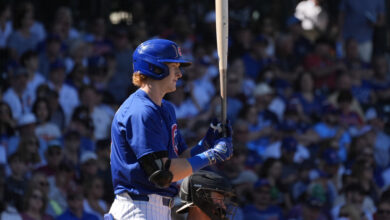
Pride Games Serve as Important Safe Harbor for LGBTQ Baseball Fans
The first time I was called a faggot by a stranger was at a baseball game. More specifically, it was outside a baseball game, just after whatever the Cubs-White Sox series was being called in 2005 at what was then US Cellular Field.
The Cubs had been absolutely trounced by the White Sox that day and my friends and I hopped on the Red Line to head home. I grew up in the south suburbs, very much in the heart of White Sox country. As such, I was alone in Cubs gear among my group that was mostly decked out in Sox colors.
That’s when I caught the eye and ire of a fan fueled by a big Sox win and a little alcohol, not to mention the safety he felt in numbers.
“The pride parade is up north, fag.”
Wait, how’d this guy know I’m gay?
He obviously didn’t know and it was just a hyper-aggressive and incredibly ignorant thing for a grown man to say at all, let alone to a 14-year-old. Even so, I panicked. No one else knew a thing, but it went a long way toward reinforcing the idea that as a gay person, I had no place at a baseball game.
Of course, this kind of hostility isn’t unique to White Sox fans, or even to baseball in general. Sporting events of any kind are often less than welcoming for people who identify as LGBTQ.
What most see as a relaxing afternoon at the ballpark can be riddled with additional questions for a gay man wondering if he can sit with his arm around his partner like the straight couple sitting in front of him. Or maybe a transgender woman wondering if she’s “passing” enough to sit in the bleachers without being heckled. Or a queer teenager wondering pessimistically if their favorite players on the field would be supportive of their identity.
That inherent discomfort and uncertainty is part of the reason that events like the Cubs’ annual Pride Day are so important. Things have gotten better for LGBTQ people in all areas of life, but the problems associated with being a marginalized group exist in life and at baseball games. A same-sex couple still has to give extra thought to whether it’s safe to hold hands walking down the concourse after a Cubs win. Maybe more thought to doing so after a loss.
A pride event — this year’s takes place on June 23 at Wrigley Field — may be the one game out of 81 where the default answer shifts from “I don’t know” to “Yes.” It’s the only time when one can go to the park and feel at least reasonably confident that most people in attendance will not get drunk and hurl a slur in their direction for displaying the same kind of public affection that has been frequently displayed at ballparks — and just public spaces in general — for decades.
The value of that sense of safety and a default assumption of acceptance is immeasurable and difficult to explain to those who have never known anything else. Pride Days/Nights at ballparks are quite frequently derided by people who feel that they’re unnecessary at best or offensive at worst. Needless to say, I would challenge that point of view based on my own experiences and the experiences of others like me.
As a married 31-year-old man with a sense of self-confidence that I consider at least adequate, I still struggle with whether it’s safe for me to be visibly gay during a ballgame. That feeling is amplified for young people who are still figuring out who they are and who might not know anything else for sure except that they’re Cubs fans. What’s more, they don’t know if that identity fits with the rest of who they are.
Pride event tell those kids that their identity does fit, that there’s nothing incompatible about being a baseball fan who is LGBTQ.
Is one night a year enough? Of course not. It’s easy to find criticism of the commercialization of pride events, ranging from nights like these at baseball games to insurance companies having floats at the parade, so I’ll refrain from re-litigating it here except to say that I get it and think there’s plenty of merit to it.
Still, these events can help break through the constant noise that suggests baseball games aren’t a welcoming place for LGBTQ-identified people. They create safety and an assumption of things being okay, even if it is only for a few hours.
For some people, especially young people struggling to find their way, that’s the most precious thing in the world.
Ed. note: The 19th annual Out at Wrigley, believed to be the first event of its kind and dubbed “the nation’s original gay day,” will be held on August 25.

